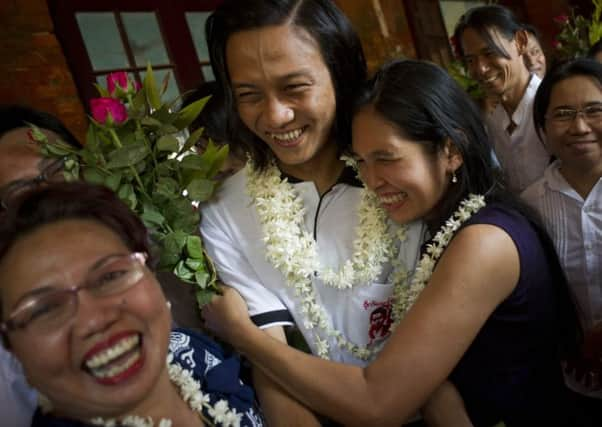Burma frees political prisoners as Aung San Suu Kyi takes control


Burmese media reported that more than 60 students arrested a year ago during a protest over education reforms were released by a court in the central town of Tharrawaddy. The releases were part of a general amnesty that also covered other convicts ahead of Burma’s traditional New Year festival, often the occasion for prisoner releases.
Photos from the scene showed some of the released prisoners being presented with bouquets and garlands by well-wishers. Rights groups estimated that 100 political detainees remained in prison when a military-backed government was succeeded by Suu Kyi’s National League for Democracy party late last month.
Advertisement
Hide AdAdvertisement
Hide AdAbout 400 others were being held pending trial, including those freed in Tharrawaddy. Different procedures are required for the release of people from the two groups.
“Today’s release of most of the student protesters is a huge step forward for human rights in Burma, and we are delighted that these men and women will walk free.
“It sends a strong message about the new government’s intention to end the cycle of political arrest and detention in Burma,” said Laura Haigh, Burma researcher for the human rights group Amnesty International.
“We are now looking forward to the release of all other prisoners of conscience - including those students who are facing charges in other courts. The new government must ensure that no prisoner of conscience is left in jail,” she said in a statement.
Under the previous government that took power in 2011, more than 1,100 political detainees were released. The junta that held power before then kept Ms Suu Kyi under house arrest for years, and jailed hundreds of her supporters and other critics.
Ms Suu Kyi, who holds the specially created post of state counsellor, announced Thursday in a statement on the Facebook page of the office of President Htin Kyaw that the release of political prisoners was a priority. It was her first official act in her new job, which is akin to that of prime minister.
By agreement of her party, Suu Kyi is the de facto head of government, though the military-era constitution does not allow her to be president because her two sons have British citizenship.